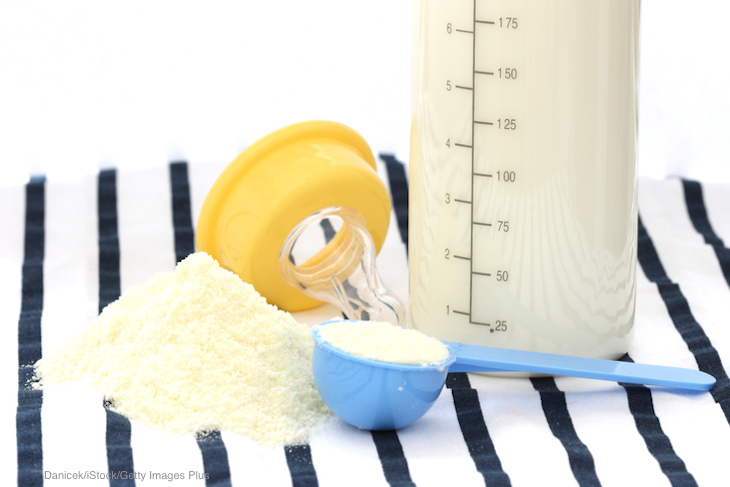Infant formula cronobacter is an issue that is not well known. Four infants are sick, three with Cronobacter infections and one with a Salmonella infection, according to the FDA, after being fed powdered infant formula. What is cronobacter and why is it an issue in this product? And how can you protect your child?

The illnesses were announced on February 17, 2022 by the FDA. The infants live in Minnesota, Ohio, and Texas. The babies allegedly got sick from September 6, 2021 through January 11, 2022. One death has been reported but has not been confirmed to be “solely attributable” to Cronobacter infection, according to the notice.
The FDA is advising parents not to use Similac, Alimentum, or EleCare powdered infant formulas, if the first two digits of the codes on the can are 22 through 37, the code on the container contains K8, SH, or Z2, and the expiration date is 4-1-2022 or later. This advisory does not include liquid formula products or any metabolic deficiency nutrition formulas. These products were made at Abbott Nutrition’s Sturgis, Michigan facility. The formula was also distributed in Canada.
The FDA has ordered an onsite inspection of the facility. So far, environmental samples taken from that venue have tested positive for Cronobacter, and there have been “adverse inspectional observations” made by FDA investigators. A review of the firm’s internal records indicate environmental contamination with Cronobacter sakazakii, and the firm’s destruction of product due to the presence of Cronobacter.
What is Cronobacter?
Cronobacter sakazakii is an opportunistic gram-negative bacteria that occurs naturally in the environment. It lives in dry foods, such as powdered formula, powdered milk, and starches.
The pathogen can cause illness in everyone, including symptoms of diarrhea and urinary tract infections, but is most serious for infants. Only a few cases are reported to the CDC every year, but since this is not a reportable infection, cases may be much higher than the official count.
These infections are rare but are very high risk for newborn infants, especially infants who are less than three months old, who were born prematurely, or have a weakened immune system. In addition, some medical treatments, such as chemotherapy, can make infants more susceptible to serious complications from this pathogen.
Cronobacter can cause sepsis, which is an infection of the blood, and can also cause meningitis, which is swelling of the membranes that surround the brain and spinal cord.
Why Is Powdered Infant Formula a Risk Factor?
Powdered formula is not sterile, unlike ready-to-feed and liquid concentrate formulas. According to the CDC, “Manufacturers report that, using current methods, it is not possible to eliminate all germs from powdered infant formula in the factory.” While the powdered is heat treated, it isn’t subject to high temperatures for enough time to sterilize it.
The powder can be contaminated in several ways, although the mechanism is not well understood. It can be contaminated from the raw ingredients, during the manufacturing process, or while the formula is being prepared or reconstituted. The contamination is more likely when reconstituted formula is kept at unsafe temperatures before use or is stored longer than the manufacturer recommends.
Infant Formula Cronobacter Symptoms
The first symptoms of a Cronobacter infection in infants is typically a fever. The baby may cry or have very low energy, and it may be difficult to feed him or her. Other symptoms include irritability, jaundice, grunting breaths, abnormal movements, and temperature changes. Any infant with those symptoms should see a doctor as soon as possible.
Reduce the Risk of Cronobacter Infection
Always follow package directions when using powdered infant formula. This formula should never be diluted. And never make or feed homemade infant formula, since it is very difficult to get the proper essential nutrients in a homemade formula.
According to the Minnesota Department of Health, follow these steps when you prepare powdered infant formula:
First, wash your hands thoroughly with soap and water. Clean work surfaces such as countertops and sinks and anything that may come into contact with the formula.
All bottles and nipples should be sanitized in boiling water for five minutes before the first use. The USDA recommends that bottles should be sanitized for the first three months of a baby’s life; after that time period, wash with a bottle brush in hot, soapy water, rinse with hot water, and air dry. You can also use a dishwasher.
The water used to reconstitute powdered infant formula should be brought to a rolling boil for one minute. Do not boil longer than that time, since more boiling can concentrate impurities in the water.
The MDH says that, in most cases, it’s safe to let the water cool to room temperature before adding it to the formula. But WHO and the CDC recommend using high temperature boiling water to mix powdered formula. However, mixing formula with boiled water that has been cooled for less than 30 minutes may make the formula clump and can destroy probiotics and nutrients. And it increases the risk of burns.
So always talk to your healthcare provider about feeding your infant and for recommendations for safe formula preparation and advice on which method to follow. Your doctor can weigh the risks and benefits for your child about the temperature of the water added to powdered infant formula.

If your infant has been sickened with a Cronobacter or Salmonella infection after feeding him or her powdered infant formula, please contact our experienced attorneys for help at 1-888-377-8900 or text us at 612-261-0856. Our firm represents clients in lawsuits against grocery stores and food processors, and families in wrongful death cases.




